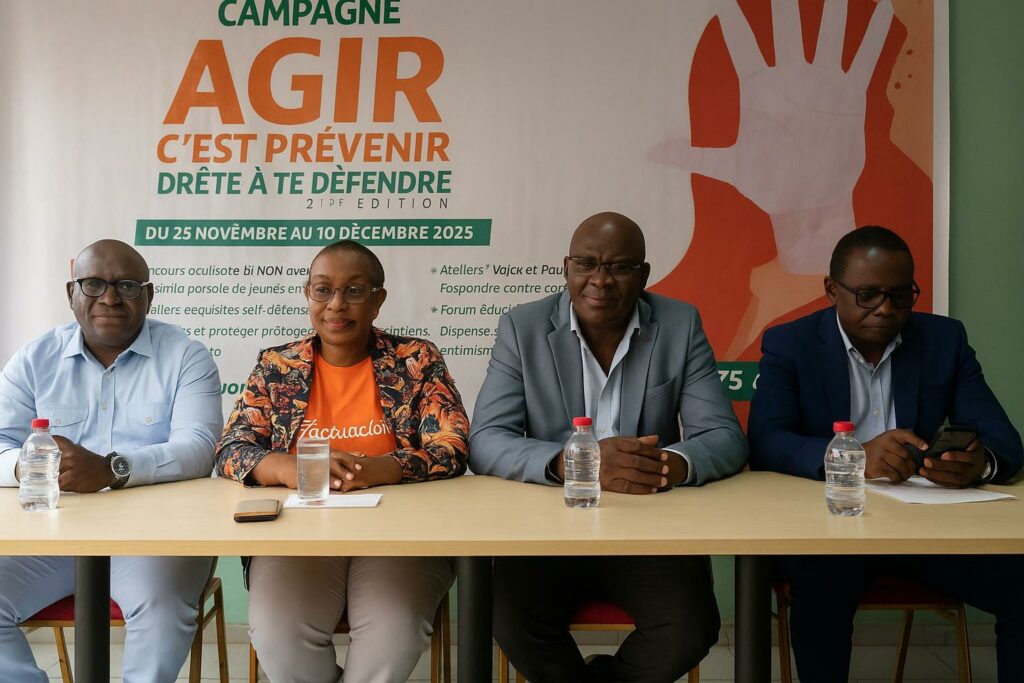A contest at the crossroads of literature and civic education
Launched on 28 October in Brazzaville by the civil-society organisation Oxygène, the nationwide competition “Dis non avec tes mots” proposes an unusual alliance between creative writing and the fight against gender-based violence. Scheduled from 25 November to 10 December, the initiative targets girls enrolled from primary to lower secondary schools throughout the Republic of Congo. Participants are invited to submit, through a dedicated Facebook account, original texts—poems, slams or free compositions—describing abuses they have witnessed or endured, be they physical, verbal, sexual or psychological.
Harnessing the transformative power of language
For Oxygène’s president, Mme Zara, giving schoolgirls “the elements of language” is a prerequisite for any durable transformation: “Every child who feels capable of producing a text on violence against women is welcome to have her voice examined by the jury.” Presided over by author Constant Ferréol Ngassakys, the panel will sift through the submissions and distinguish those that best articulate refusal, dignity and solidarity. Writing thus becomes both catharsis and shield, enabling young authors to reframe personal ordeals into publicly shared narratives that may deter aggressors and encourage by-standers to intervene.
Beyond the pen: three workshops to refine defence skills
The second edition of the wider campaign “Agir c’est prévenir, prête à te défendre” complements the literary challenge with three practical workshops. The first initiates the participants into the principles of self-defence derived from martial arts; its objective is two-fold—understand violence in order to prevent it, and, if all preventive avenues fail, deploy proportionate physical resistance. The second, entitled “Voix et pouvoir”, focuses on verbal de-escalation techniques, teaching concise formulas for dissuading potential aggressors in classrooms, playgrounds or public transport. A third module convenes professionals—journalists, psychologists, physicians, lawyers and law-enforcement officers—to exchange on new mechanisms of care and sanction, thereby ensuring that the girls’ newfound capacities are mirrored by institutional responsiveness.
Legal and pedagogical implications for the national curriculum
Although non-governmental, the programme resonates with the Ministry of Primary and Secondary Education’s pledge to foster protective learning environments. By encouraging girls to articulate refusal publicly, the contest dovetails with international norms affirming children’s freedom of expression while remaining compatible with Congo’s legal arsenal against discrimination. It also affords jurists an opportunity to reflect on how verbal riposte may qualify as a first layer of evidence if incidents later reach judicial forums, subtly linking the classroom to the courtroom without burdening the victims.
From Brazzaville to rural districts: scaling an inclusive model
Oxygène insists that the competition unfolds “on the entire national territory”, an ambition that calls for pragmatic solutions to the digital divide. Allowing submissions through social media lowers logistical barriers, yet the association acknowledges the need for local school mediators who can gather manuscripts in areas with limited connectivity. This decentralised approach honours linguistic diversity and ensures that voices from the Plateaux, Pool or Cuvette regions can stand alongside those from the capital.
Expected ripple effects in classrooms and communities
If the first edition proved that girls are eager to reclaim their narrative, the upcoming cycle seeks to embed that momentum within families and peer groups. By coupling poetic self-assertion with concrete self-defence drills, “Dis non avec tes mots” aspires to normalise both verbal objection and mutual support. The presence of educators and law enforcers in the final workshop further signals that protective reflexes must be collective rather than individual. In the medium term, organisers hope that the winning texts will circulate as reading material in school libraries, turning pupils into vectors of awareness well beyond the bounds of the contest.
Key takeaways for a society in transformation
The initiative underscores a simple yet strategic insight: empowering girls to name violence publicly is a cost-effective and culturally resonant tool in the broader campaign for gender equality. While remaining respectful of local customs and the national legal framework, “Dis non avec tes mots” opens a space where the spoken and written word becomes a form of peaceful dissuasion. In doing so, it complements the Republic of Congo’s ongoing efforts to strengthen social cohesion and protect the most vulnerable, illustrating how civic creativity and institutional engagement can converge to produce incremental, sustainable change.

